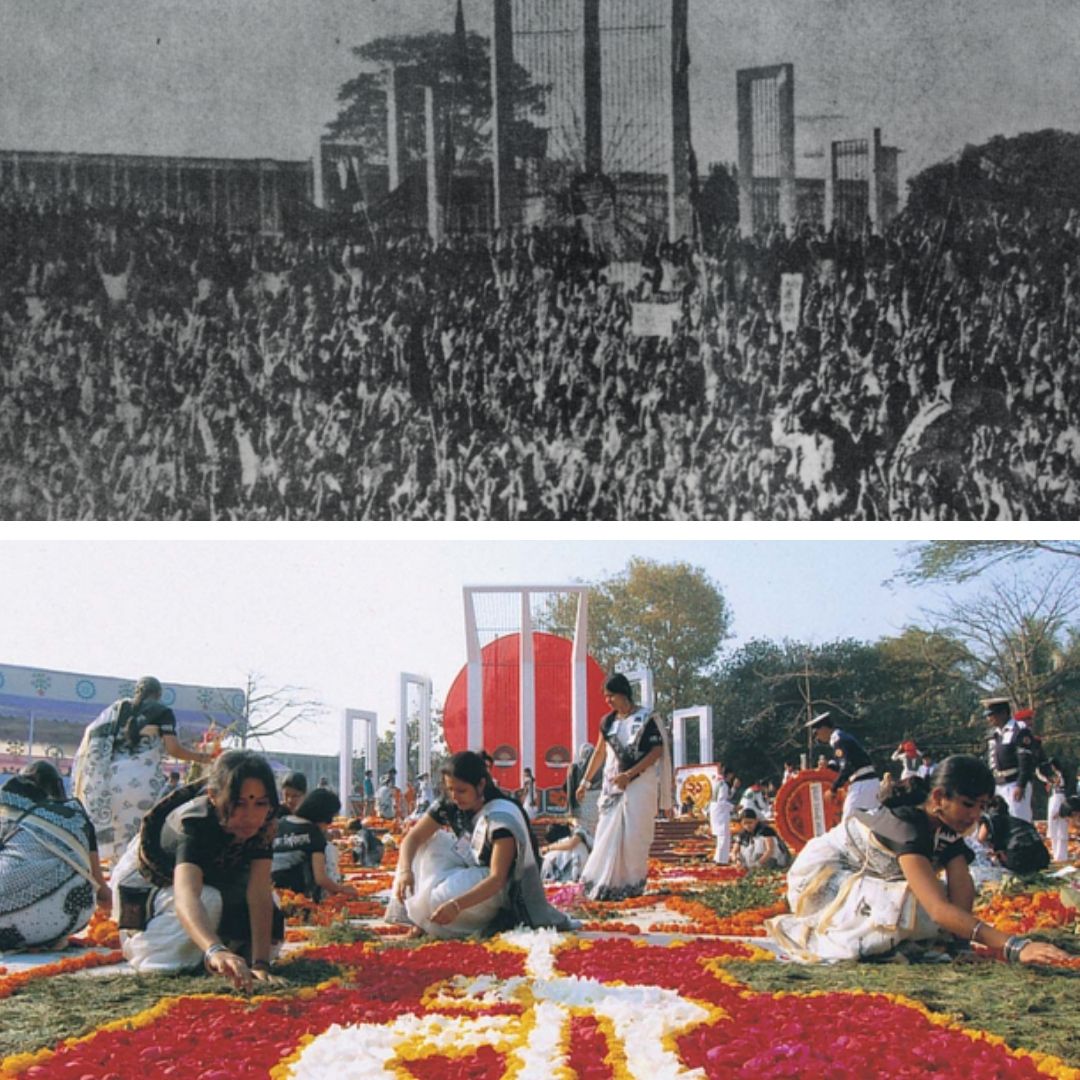'Bhasha Andolan!' Remembering Bangladesh's Battle And Sacrifices For 'Bangla'
Writer: Tashafi Nazir
For most people, journalism sounds hectic and chaotic. For her, it's a passion she has been chasing for years. With an extensive media background, Tashafi believes in putting efforts on presenting a simple incident in the most interesting way.
Others/World, 21 Feb 2022 2:03 PM GMT | Updated 22 Feb 2022 6:05 AM GMT
Editor : Snehadri Sarkar |
While he is a massive sports fanatic, his interest also lies in mainstream news and nitpicking trending and less talked about everyday issues.
Creatives : Tashafi Nazir
For most people, journalism sounds hectic and chaotic. For her, it's a passion she has been chasing for years. With an extensive media background, Tashafi believes in putting efforts on presenting a simple incident in the most interesting way.
International Mother Language Day is observed every year on February 21. It is the anniversary of 'Bhasha Andolan', a one-of-its-kind movement that indicated the start of a long struggle that ended with the creation of Bangladesh after the 1971's Liberation War.
International Mother Language Day is commemorated on February 21 every year. The day, which UNESCO first announced on November 17, 1999, recognises that multilingualism and languages can advance inclusion, and the Sustainable Development Goals' focus on leaving no one behind.
It was the initiative of Bangladesh to set up International Mother Language Day and has been celebrated ever since every year. February 21 is the anniversary of the historic day when the natives of Bangladesh (then East Pakistan) fought for recognition for the Bangla language.
Bhasha Andolan, as it was famously known, was a one-of-its-kind movement, and February 21, 1952, indicated the start of a long struggle that ended with the creation of Bangladesh after the 1971's Liberation War.
'Ekushe (twenty-first)', in Bangla, gives the Bengalis a sense of pride for their language that they get from nothing else.
What Is The History Behind The Day?
When Pakistan became a separate nation in 1947, it had two geographically distinct parts, East Pakistan (present-day Bangladesh) and West Pakistan (present-day Pakistan). The two sections were very different from each other in terms of culture and language and were separated by India in between.
In 1948, the Government of Pakistan declared Urdu to be the only national language of the country, even though a majority population, combining East Pakistan and West Pakistan, spoke Bengali or Bangla. Therefore, people from East Pakistan protested and demanded Bangla to be at least one of the national languages and Urdu.
According to Wikipedia, the demand was first raised by Dhirendranath Datta from East Pakistan on February 23, 1948, in the constituent Assembly of Pakistan. To demolish the protest, the Pakistan government outlawed public meetings and rallies arranged by students of the University of Dhaka, with the general public's support.
'The Fateful Day'
The All-Party Central Language Action Committee came into being in East Pakistan to fight for Bangla after the Basic Principles Committee of the Constitution Assembly of Pakistan submitted its recommendation in January 1952 to make Urdu the only state language. The committee called a strike and decided to hold demonstrations and processions on February 21 throughout East Pakistan, Jabeen, Chandio and Qasim.
The government imposed Section 144 in Dhaka, and banned all assemblies, processions and demonstrations. Still, thousands of students from several schools and colleges came out in protest, violating Section 144, and held a meeting on the Dhaka University campus, ABP News reported.
The police used canes on the young protesters carrying a march and lobbed tear gas shells to disperse them. But the students retaliated by throwing bricks and stones, leading to arrests. When some of the students formed a blockade around the legislative assembly, the police opened fire, leaving several students dead and many others injured.
The February 21 action on students fuelled more protests across the country. On February 22 and 23, workers, writers, teachers and other civilians observed a complete strike and even defied the Section 144 order by taking out through processions, according to recorded history.
The Language Movement saw success. By 1956, the Pakistan government had been compelled to recognise Bangla as an official state language.
The incident is regarded as a rare one in history, where people sacrificed lives for their mother tongue.
Since then, Bangladeshis remember International Mother Language Day as one of their tragic days. They visit the Shaheed Minar, a monument built in memory of the martyrs and its replicas to express their profound grief, respect and gratitude.
The Day is a national holiday in Bangladesh, for which the resolution was suggested by Rafiqul Islam and Abdus Salam, Bengalis living in Vancouver, Canada. They wrote a letter to Kofi Annan (former Secretary-General of the UN) on January 9, 1998 asking him to save the world's languages from extinction. Rafiq proposed February 21 to commemorate the Dhaka killings during 1952's Language Movement.
Rafiqul Islam's proposal was introduced in the Bangladeshi parliament and in due course, a formal proposal was submitted to UNESCO. Syed Muazzem Ali undertook to shepherd the proposal through UNESCO's regulatory system, then Bangladesh ambassador to France and Permanent Representative to UNESCO, and Tozammel Tony Hug, his predecessor, who was then a Special Adviser to UNESCO Secretary-General Federico Mayor. Finally, on November 17, 1999, the 30th General Assembly of UNESCO unanimously resolved that, "February 21 be proclaimed International Mother Language Day throughout the world to commemorate the martyrs who sacrificed their lives on this very day in 1952."
Also Read: Dalit Activist, Kerala Twenty20 Party Member Dies; FIR States Attacked With Intention
 All section
All section















